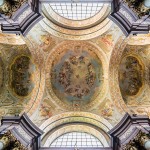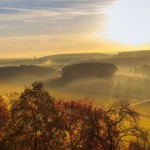Laudato si’, whether you approach it with the humility of an open and teachable heart, or whether you view it through the eyes of a questioning and thoughtful skeptic, is an extraordinary mosaic, one which artfully draws from the material, the moral, and the spiritual.
It reminds us to be mindful both of our common home and our common oneness. It tightly binds together the sanctity of our earthly home with the sanctity of human life – at every stage, and in every form, without exception.
As an encyclical addressed to humanity as a whole, it is subject to parsing, exegesis, and critical application. As a pronouncement to the faithful in particular, it is, in addition, subject to a humble heart; it cannot be dismissed peremptorily.
As many of you know, the title is taken directly from the Canticle of the Sun, or the Canticle of the Creatures, written in the 13th Century, by the (perhaps best described as) vagabond Saint whom the current Bishop of Rome honors as his namesake.
On this feast day of St. Francis, let us go back to the original source, as we contemplate together all that has been declared good, even very good.
Let us, together, recall St. Francis as he honors and submits to both the Creator and the created:
Most high, omnipotent, good Lord,
Praise, glory and honor and benediction all, are Thine.
To Thee alone do they belong, most High,
And there is no man fit to mention Thee.
Praise be to Thee, my Lord, with all Thy creatures,
Especially to my worshipful brother sun,
The which lights up the day, and through him dost Thou brightness give;
And beautiful is he and radiant with splendor great;
Of Thee, most High, signification gives.Praised be my Lord, for sister moon and for the stars,
In heaven Thou hast formed them clear and precious and fair.Praised be my Lord for brother wind
And for the air and clouds and fair and every kind of weather,
By the which Thou givest to Thy creatures nourishment.
Praised be my Lord for sister water,
The which is greatly helpful and humble and precious and pure.Praised be my Lord for brother fire,
By the which Thou lightest up the dark.
And fair is he and gay and mighty and strong.Praised be my Lord for our sister, mother earth,
[which] sustains and keeps us
And brings forth diverse fruits with grass and flowers bright.Praised be my Lord for those who for Thy love forgive
And weakness bear and tribulation.
Blessed those who shall in peace endure,
For by Thee, most High, shall they be crowned.
Praised be my Lord for our sister, the bodily death,
From the which no living man can flee.
Woe to them who die in mortal sin;
Blessed those who shall find themselves in Thy most holy will,
For the second death shall do them no ill.Praise ye and bless ye my Lord, and give Him thanks,
And be subject unto Him with great humility.
Peace
Image Credit: Wikimedia Commons, Public Domain













